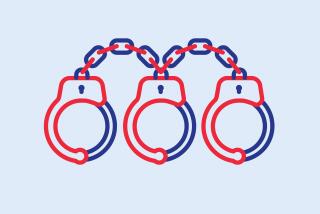Feinstein Drops Her Education Initiative
- Share via
SACRAMENTO — Barely a month after she decided not to run for governor, Sen. Dianne Feinstein pulled the plug Friday on the education initiative that she pledged to sponsor on this November’s ballot.
Feinstein admitted that an error in the measure’s first version forced her to resubmit it late last month. Still, she said state authorities doomed the initiative by taking so long that it is not yet certified for signature gathering.
The senator faced an April 15 deadline to get more than 1 million signatures to qualify the measure for the ballot.
“Time has always been short for us, but these delays have become impossible to overcome,” Feinstein said in a one-page statement issued late Friday. “It appears there is not enough time to qualify the bipartisan education initiative several of us introduced for the November ballot.”
The announcement was a stark reversal of Feinstein’s Jan. 20 pledge to push ahead with the initiative despite the logistical difficulties of getting it on the ballot.
“This has my fullest, strongest support and my full commitment,” she vowed that day, when she bowed out of the governor’s race. “I will do everything I possibly can to get it passed.”
Attorneys in the initiative industry said the errors and delays were caused by the senator’s mishandling of the matter, not the authorities who processed it. “It fell apart because it was an amateur act from Day 1,” said one lawyer. “Feinstein was unable to grasp the intricacies of the initiative process.”
On Christmas Eve, when the senator issued a surprise announcement about her plans for the ballot measure, political watchers took it as a signal that she would end months of speculation and step into the governor’s race.
The initiative appeared to be a strategic vehicle that she might have used to highlight her positions on what promises to be the most highly watched issue this election year--education.
Feinstein’s measure included several reforms that recent polls show have popular support--most notably a plan requiring students in fourth, eighth and 12th grades to pass an achievement test before they are promoted or graduate.
Her plan included a novel proposal for funding the reforms with a new $1-a-pack tax on cigarettes. It also would have made it easier for local school districts to pass bonds, by lowering the required vote from the current two-thirds to a simple majority.
On Friday, Feinstein made no reference to her own previous interest in the governor’s race. But her aides dismissed any connection between the initiative and a campaign.
They said the initiative had appeared doomed ever since January, when an error was discovered in its language. Bill Chandler, spokesman for the senator, said the first version mistakenly omitted changes to the state Constitution that would have been necessary for the proposal to modify local school bond votes.
The state attorney general’s office ruled last month that the initiative would have to be resubmitted.
Feinstein filed her second draft Jan. 29. By law, state authorities have up to seven weeks to review the proposal before it is released for signature gathering.
In her statement, Feinstein said she hopes many of the provisions in her measure will still be adopted, because they are being discussed by candidates for governor.
Some of the goals, in fact, are similar to those in a proposed ballot measure sponsored by Wilson.
Other provisions of Feinstein’s measure included lengthening of the school year to at least 180 days, incentives and support for training new teachers, and guaranteed funding for maximum class sizes of 20 students through fourth grade.
Also on Friday, a group of public school educators and Silicon Valley entrepreneurs announced at a school in San Carlos, south of San Francisco, that they are gathering signatures for yet another education initiative for the November ballot--one to greatly increase the number of charter schools.
Reed Hastings, founder of a Silicon Valley software firm and one of the measure’s driving forces, said the group, Californians for Public School Excellence, plans to spend up to $15 million on the effort.
Charter schools are public institutions funded by taxes and run by public school teachers and principals. But their charters give them more freedom than other public schools, so long as students’ performance improves. California has 140 such schools. But state law limits teachers’ and parents’ ability to create new ones. The initiative would remove those barriers.
More to Read
Get the L.A. Times Politics newsletter
Deeply reported insights into legislation, politics and policy from Sacramento, Washington and beyond. In your inbox twice per week.
You may occasionally receive promotional content from the Los Angeles Times.









